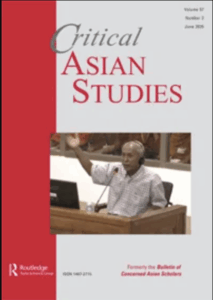
Theara Thun
in Critical Asian Studies, 57(2), 274–290
Abstract: The entire education system in Cambodia was destroyed and the vast majority of its educated population were either killed or fled the country during the Khmer Rouge period (1975-1979). Since then, the higher education infrastructure has encountered numerous challenges, including a serious shortage of qualified teachers. Despite this, in recent years a very large pool of unqualified doctoral degree holders, popularly identified as paṇḍits, has emerged and includes politicians, business people, and monks. This article examines this situation by discussing how higher education degrees have become an attractive source of social prestige, political control, and economic influence in post-war Cambodia. It also discusses how popular understandings of paṇḍit, which also carries religious, social, and political significance, has become a barrier to the promotion of academic merit within the country’s higher education system.
About the author: Theara Thun was a NUS-HYI Joint Doctoral Scholar from 2012-16.
